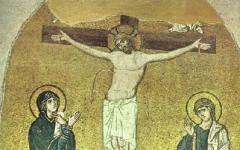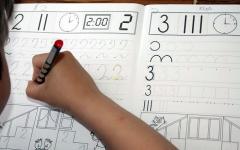He came into the room to shut the windows while we were still in bed and I saw he looked ill. He was shivering, his face was white, and he walked slowly as though it ached to move.
"What"s the matter, Schatz?"
"I"ve got a headache."
"You better go back to bed."
"No. I"m all right."
"You go to bed. I"ll see you when I"m dressed."
But when I came downstairs he was dressed, sitting by the fire, looking a very sick and miserable boy of nine years. When I put my hand on his forehead I knew he had a fever.
"You go up to bed," I said, "you"re sick."
"I"m all right," he said.
When the doctor came he took the boy"s temperature.
"What is it?" I asked him.
"One hundred and two."
Downstairs, the doctor left three different medicines in different colored capsules with instructions for giving them. One was to bring down the fever, another a purgative, the third to overcome an acid condition. The germs of influenza can only exist in an acid condition, he explained. He seemed to know all about influenza and said there was nothing to worry about if the fever did not go above one hundred and four degrees. This was a light epidemic of flu and there was no danger if you avoided pneumonia.
Back in the room I wrote the boy"s temperature down and made a note of the time to give the various capsules.
"Do you want me to read to you?"
"All right. If you want to," said the boy. His face was very white and there were dark areas under his eyes. He lay still in the bed and seemed very detached from what was going on.
I read aloud from Howard Pyle"s Book of Pirates; but I could see he was not following what I was reading.
"How do you feel, Schatz?" I asked him.
"Just the same, so far," he said.
I sat at the foot of the bed and read to myself while I waited for it to be time to give another capsule. It would have been natural for him to go to sleep, but when I looked up he was looking at the foot of the bed, looking very strangely.
"Why don"t you try to go to sleep? I"ll wake you up for the medicine."
"I"d rather stay awake."
After a while he said to me, "You don"t have to stay in here with me, Papa, if it bothers you."
"It doesn"t bother me."
"No, I mean you don"t have to stay if it"s going to bother you."
I thought perhaps he was a little lightheaded and after giving him the prescribed capsules at eleven o"clock I went out for a while.
It was a bright, cold day, the ground covered with a sleet that had frozen so that it seemed as if all the bare trees, the bushes, the cut brush and all the grass and the bare ground had been varnished with ice. I took the young Irish setter for a little walk up the road and along a frozen creek, but it was difficult to stand or walk on the glassy surface and the red dog slipped and slithered and I fell twice, hard, once dropping my gun and having it slide away over the ice.
We flushed a covey of quail under a high clay bank with overhanging brush and I killed two as they went out of sight over the top of the bank. Some of the covey lit in trees, but most of them scattered into brush piles and it was necessary to jump on the ice-coated mounds of brush several times before they would flush. Coming out while you were poised unsteadily on the icy, springy brush they made difficult shooting and I killed two, missed five, and started back pleased to have found a covey close to the house and happy there were so many left to find on another day.
A DAY’S WAIT by E. Hemingway
He came into the room to shut the windows while me were still in bed and I saw he looked ill. He was shivering, his face was white, and he walked slowly as though it ached to move.
"What"s the matter, Schatz?"
"I"ve got a headache".
"You better go back to bed".
"No, I am all right".
"You go to bed. I"ll see you when I"m dressed".
But when I came downstairs he was dressed, sitting by the fire, looking a very sick and miserable boy of nine years. When I put my hand on his forehead I knew he had a fever.
"You go up to bed," said, "you are sick".
"I am all right", he said.
When the doctor came he took the boy"s temperature.
"What is it?" I asked him.
"One hundred and two."
Downstairs, the doctor left three different medicines in different coloured capsules with instructions for giving them. He seemed to know all about influenza and said there was nothing to worry about if the fever did not go above one hundred and four degrees. This was a light epidemic of influenza and there was no danger if you avoided pneumonia.
Back in the room I wrote the boy"s temperature down and made a note of the time to give the various capsules.
"Do you want me to read to you?"
"All right. If you want to," said the boy. His face was very white and there were dark areas under his eyes. He lay still in the bed and seemed very detached from what was going on.
I read about pirates from Howard Pyle"s "Book of Pirates", but I could see he was not following what I was reading.
"How do you feel, Schatz?" I asked him.
"Just the same, so far," he said.
I sat at the foot of the bed and read to myself while I waited for it to be time to give another capsule. It would have been natural for him to go to sleep, but when I looked up he was looking at the foot of the bed.
"Why, don"t you try to go to sleep? I"ll wake you up for the medicine."
"I"d rather stay awake."
After a while he said to me. "You don"t have to stay in here with me, Papa, if it bothers you."
"It doesn"t bother me."
"No, I mean you don"t have to stay if it"s going to bother you."
I thought perhaps he was a little light-headed and af ter giving him the prescribed capsules at eleven o"clock I went out for a while…
At the house they said the boy had refused to let any one come into the room.
"You can"t come in," he said. "You mustn"t get what I have." I went up to him and found him in exactly the same position I had left him, white-faced, but with the tops of his cheeks flushed by the fever, staring still, as he had stared, at the foot of the bed.
I took his temperature.
"What is it?"
"Something like a hundred," I said. It was one hundred and two and four tenths.
"It was a hundred and two," he said.
"Who said so? Your temperature is all right," I said. "It"s nothing to worry about."
"I don"t worry," he said, "but I can"t keep from thinking."
"Don"t think," I said. "Just take it easy."
"I"m taking it easy," he said and looked straight ahead.
He was evidently holding tight onto himself about something.
"Take this with water."
"Do you think it will do any good?"
"Of course, it will."
I sat down and opened the "Pirate" book and commenced to read, but I could see he was not following, so I stopped.
"About what time do you think I"m going to die?" he asked.
"What?"
"About how long will it be before I die?"
"You aren"t going to die. What"s the matter with you?"
"Oh, yes, I am. I heard him say a hundred and two."
"People don"t die with a fever of one hundred and two.
Мы еще лежали в постели, когда он вошел в комнату затворить окна, и я сразу увидел, что ему нездоровится. Его трясло, лицо у него было бледное, и шел он медленно, как будто каждое движение причиняло ему боль.
Что с тобой, Малыш?
У меня голова болит.
Поди ляг в постель.
Нет, я здоров.
Ляг в постель. Я оденусь и приду к тебе.
Но когда я сошел вниз, мой девятилетний мальчуган, уже одевшись, сидел у камина - совсем больной и жалкий. Я приложил ладонь ему ко лбу и почувствовал, что у него жар.
Ложись в постель, - сказал я, - ты болен.
Я здоров, - сказал он.
Пришел доктор и смерил мальчику температуру.
Сколько? - спросил я.
Сто два.
Внизу доктор дал мне три разных лекарства в облатках разных цветов и сказал, как принимать их. Одно было жаропонижающее, другое слабительное, третье против кислотности. Бациллы инфлуэнцы могут существовать только в кислой среде, пояснил доктор. По-видимому, в его практике инфлуэнца была делом самым обычным, и он сказал, что беспокоиться нечего, лишь бы температура не поднялась выше ста четырех. Эпидемия сейчас не сильная, ничего серьезного нет, надо только уберечь мальчика от воспаления легких.
Вернувшись в детскую, я записал температуру и часы, когда какую облатку принимать.
Хорошо. Если хочешь, - сказал мальчик. Лицо у него было очень бледное, под глазами темные круги. Он лежал неподвижно и был безучастен ко всему, что делалось вокруг него.
Как ты себя чувствуешь, Малыш? - спросил я.
Пока все так же, - сказал он.
Почему ты не попробуешь заснуть? Я разбужу тебя, когда надо будет принять лекарство.
Нет, я лучше так полежу.
Через несколько минут он сказал мне:
Папа, если тебе неприятно, ты лучше уйди.
Откуда ты взял, что мне неприятно?
Ну, если потом будет неприятно, так ты уйди отсюда.
Я решил, что у него начинается легкий бред, и, дав ему в одиннадцать часов лекарство, вышел из комнаты.
День стоял ясный, холодный; талый снег, выпавший накануне, успел подмерзнуть за ночь, и теперь голые деревья, кусты, валежник, трава и плеши голой земли были подернуты ледяной корочкой, точно тонким слоем лака. Я взял с собой молодого ирландского сеттера и пошел прогуляться по дороге и вдоль замерзшей речки, но на гладкой, как стекло, земле не то что ходить, а и стоять было трудно; мой рыжий пес скользил, лапы у него разъезжались, и я сам растянулся два раза, да еще уронил ружье, и оно отлетело по льду в сторону.
Из-под высокого глинистого берега с нависшими над речкой кустами мы спугнули стаю куропаток, и я подстрелил двух в ту минуту, когда они скрывались из виду за береговым откосом. Часть стаи опустилась на деревья, но большинство куропаток попряталось, и, для того чтобы снова поднять их, мне пришлось несколько раз подпрыгнуть на кучах обледенелого валежника. Стоя на скользких, пружинивших сучьях, стрелять по взлетавшим куропаткам было трудно, и я убил двух, по пятерым промазал и отправился в обратный путь, довольный, что набрел на стаю около самого дома, радуясь, что куропаток хватит и на следующую охоту.
Дома мне сказали, что мальчик никому не позволяет входить в детскую.
Не входите, - говорил он. - Я не хочу, чтобы вы заразились.
Я вошел к нему и увидел, что он лежит все в том же положении, такой же бледный, только скулы порозовели от жара, и по-прежнему, не отрываясь, молча смотрит на спинку кровати.
Я смерил ему температуру.
Сколько?
Около ста градусов, - ответил я. Термометр показывал сто два и четыре десятых.
Раньше было сто два? - спросил он.
Кто это тебе сказал?
Температура у тебя не высокая, - сказал я. - Беспокоиться нечего.
Я не беспокоюсь, - сказал он, - только не могу перестать думать.
А ты не думай, - сказал я. - Не надо волноваться.
Я не волнуюсь, - сказал он, глядя прямо перед собой. Видно было, что он напрягает все силы, чтобы сосредоточиться на какой-то мысли.
Прими лекарство и запей водой.
Ты думаешь, это поможет?
Конечно, поможет.
Я сел около кровати, открыл книгу про пиратов и начал читать, но увидел, что он не слушает меня, и остановился.
Как по-твоему, через сколько часов я умру? - спросил он.
Сколько мне еще осталось жить?
Ты не умрешь. Что за глупости!
Нет, я умру. Я слышал, как он сказал сто два градуса.
Никто не умирает от температуры в сто два градуса. Что ты выдумываешь?
Нет, умирают, я знаю. Во Франции мальчики в школе говорили, когда температура сорок четыре градуса, человек умирает. А у меня сто два.
Он ждал смерти весь день; ждал ее с девяти часов утра.
Бедный Малыш, - сказал я. - Бедный мой Малыш. Это все равно как мили и километры. Ты не умрешь. Это просто другой термометр. На том термометре нормальная температура тридцать семь градусов. На этом девяносто восемь.
Ты это наверное знаешь?
Ну конечно, - сказал я. - Это все равно как мили и километры. Помнишь? Если машина прошла семьдесят миль, сколько это километров?
А, - сказал он.
Но пристальность его взгляда, устремленного на спинку кровати, долго не ослабевала. Напряжение, в котором он держал себя, тоже спало не сразу, зато на следующий день он совсем раскис и то и дело принимался плакать из-за всякого пустяка.
Эрнест Хемингуэй. Ожидание. 1933 г.
Setting of A Days Wait By Ernest Hemingway?
already exists.
Would you like to merge this question into it?
already exists as an alternate of this question.
Would you like to make it the primary and merge this question into it?
exists and is an alternate of .
A summery of days wait
4 people found this useful
Ernest Hemingway . Hemingway was an American writer - novels and news articles mostly. . Born in 1899, in 1971 his first career was working at the Kansas Star , a news pape… r company. . Ernest Hemingway left his job with the Kansas Star to join World War One , where he served as a Red Cross ambulance driver. He was injured during a delivery run which was the last rout of his carrer. . His writings that followed were frequently about death and psychological trama associated with war. . He is sometimes remembered for his association with the Spanish civil war of the 1930"s when he was a reporter. This bloody conflict between communism and fascism was a prelude to WWII......WWII being almost entirely about a similar conflict between fascist Germany and communist Russia with their respective allies. . Hemingway novels have been made into several movies with generally decent interpretations offered. . He was a larger than life figure with many legends being attached to him. For example, he was supposedly a notorious and brutal drunk. The margarita was supposedly created for him. His sexual exploits were vast and ruthless, with many broken hearts. He was possibly homosexual at times. He spent time in Cuba and knew Castro. He suffered a vast array of illnesses and injuries in his life and was inaccurately written up in the papers as deceased on at least two occassions. His actual death was in 1961 as a result of a loosing battle with lifelong depression. He reportedly took a shotgun blast to the head.
Ernest Hemingway (1899-1961) was a journalist and author who won aPulitzer prize and a Nobel Prize in Literature. His short storiesand novels earned critical acclaim as well a… s popularity. Some arenow considered as classics of American literature. He was thought to have died in a bizarre double plane accident inUganda in 1954, but survived to accept his Nobel prize, although hecould not attend the ceremony. The following year, his injuries andthe effects of alcohol abuse left him bedridden. He lived forseveral years in Cuba, leaving shortly after the coup by FidelCastro (with whom he was nonetheless on friendly terms). He died athis ranch in Idaho in 1961 after having been previouslyhospitalized for depression.
A Day"s Wait describes a miscommunication between a father and hisson and the tragedy it brings. The story begins with a little boywho is sick with the flu in the winter. The … doctor tells the fatherthat his temperature is 102 degrees Fahrenheit. The boy starts totell his father how he will die because in France 102 degrees islethal. His father explains that in France they use Celsius, so theboy will be fine.
The Three Days Blow Ernest Hemingway " The Three Days Blow" is a plot less story in a dramatic way. Two friends Nick and Bill meet at Bill"s cottage. The weather is shown viol… ent. There is rain and storm. So, this is an ideal situation to stay inside home. They make fire, burn lots of logs and make themselves warm. They drink different alcohol and go on talking about different topics such as books, fishing, girlfriend, hunting, etc. without any plot, the story ends. The topics of the talk change suddenly from one subject to another. There is no third character. We know a lot about the subject, which go through their conversation only. Bill and Nick have no specific purpose of meetings or talking. The weather creates situation for them. This keeps them inside when they talk about different topics. Hemingway creates situation of drinking so that they can reveal their feelings. The scene moves forward excluding the opening exposition. He talks about the weather- rainfall, storm, wind, surf, etc. suddenly, he begins to have different sorts of drinks and talk about games of baseball. The topic of their talk shifts to books and writer. They slowly get drunk and talk about their habits. Then, they talk about nick"s girlfriend. This is the climax of the story. The theme of this scene lastly talks about hunting and go to. When we read the drama, this scene opens one by one. The title of the story says something symbolically. Weather doesn"t remain same always. Even a single day we can experience the fluctuation of weather. This is the principle of nature. Weather is dynamic; it doesn"t remain constant all the time. Just like weather, mental conflict of tension of suffering is presented in several scenes or sequence of events. In the beginning scene, nick looks calm but with the movement of different scenes, his calm face changes. The setting of this story goes to be open with a nice scene. Nick is presented in the beginning on the way. He is going up to the village. Natural presentation is also seen. There is an orchard and we see the blowing of air, breeze that is the first autumn storm. Nick picks up an apple and keeps it in his pocket. The two characters Nick and Bill are presented inside the house. They have their personal talk. The story begins with the scene of woods, lakes, kitchen, sitting room, dining room etc. In the beginning Nick is seen and the story ends with guns. They go down where Bill"s father was hunting. There are similar events between the whether and sequence of events of "The Three Days Blow". There is conflict in the character Nick. He is getting confused about his girl friend Marjorie. He wants to meet her again but Bill makes him leave her. He wants to marry her although her mother is bad. So the conflicts are similar. There is union in both weather hand love of Nick with Marjorie. Weather becomes fair and love also becomes negotiable. The story is dramatic because there are characters and dialogues and unity of time and place. There are two characters Nick and Bill who have continuous dialogues like in the drama. The setting of the story is also like a drama. There is internal and external scene. These scenes can be converted into the drama. They just talk about some little subject that is the subject matter of both drama and story. These story deals with love. Marjorie"s mother can be presented as an antagonist, Nick as a protagonist and Bill as an inciting force. So the story is dramatic. The three-day blow and Nick"s mental condition are related. Marjorie"s business is fundamental subject of the story. Nick, though he is not enjoyed with her, is going to get married. Because of her mother, he breaks relation from Marjorie, his beloved. After different kinds of talks Bill and Nick"s conversations is concentrated. Marjorie"s business has broken his relation with her easily. So moment from Nick"s conflicts of love affairs, through suffering and separation to reconciliation ends. Thus Marjorie"s business is like a three day below that comes and disappears itself. Three-day blow comes, threatens and finally goes away. In the same way, conflict of love appears and disappears with despair and again with hope. The Marjorie"s business is fundamental subject of this story. Nick, though he was not engaged with her, was going to get married. Because of her mother he broke relation from Marjorie, his beloved. His mother was very terrible. To marry her meant he would have married the whole family her mother. Though the character Bill, the writer seems to be giving practical message. Nick seems to be emotional but Bill is practical. Nick is ready to accept Marjorie although her mother was bad. He really loves her and ready to accept her. His life can be compared with the storm. The moment when he met Marjorie and he left her due to unfavorable situation that moment is just like a violent storm, which doesn"t last for long time in the nature. Bill is practical. He says Nick to forget all the events related with Marjorie and lead his wife towards new direction. Human life is a mixture of sorrow and happiness. If any disastrous event comes in our life also, we should control our emotion and lead our life towards new phase and time happily. We should have capacity to adjust with all the fluctuations that come in our life.
… sk questions to confirm his beliefs. On the other hand, he firmly believed in his mind that he would die, and wanted to do it with dignity. So, it depends on the way you look at it.
Answered
In Ernest Hemingway
A Day"s Wait by Ernest Hemingway is the story of a boy and how hismisunderstanding leads to many changes in his own mind. The boygets the flu and the doctor takes his temperat… ure. When the doctortells the boy and his father that his temperature is 102 degrees F,the boy is sure he is going to die. He had heard in France that ahuman body could not survive with a temperature over 44 degrees. Hedidn"t understand the difference in Celsius and Fahrenheit. As thefather explains the difference, the boy relaxes and drifts off tosleep. He is amazed and thankful when he wakes up the next morningand is very emotional over small things.
A DAY’S WAIT by E. Hemingway
He came into the room to shut the windows while me were still in bed and I saw he looked ill. He was shivering, his face was white, and he walked slowly as though it ached to move.
"What"s the matter, Schatz?"
"I"ve got a headache".
"You better go back to bed".
"No, I am all right".
"You go to bed. I"ll see you when I"m dressed".
But when I came downstairs he was dressed, sitting by the fire, looking a very sick and miserable boy of nine years. When I put my hand on his forehead I knew he had a fever.
"You go up to bed," said, "you are sick".
"I am all right", he said.
When the doctor came he took the boy"s temperature.
"What is it?" I asked him.
"One hundred and two."
Downstairs, the doctor left three different medicines in different coloured capsules with instructions for giving them. He seemed to know all about influenza and said there was nothing to worry about if the fever did not go above one hundred and four degrees. This was a light epidemic of influenza and there was no danger if you avoided pneumonia.
Back in the room I wrote the boy"s temperature down and made a note of the time to give the various capsules.
"Do you want me to read to you?"
"All right. If you want to," said the boy. His face was very white and there were dark areas under his eyes. He lay still in the bed and seemed very detached from what was going on.
I read about pirates from Howard Pyle"s "Book of Pirates", but I could see he was not following what I was reading.
"How do you feel, Schatz?" I asked him.
"Just the same, so far," he said.
I sat at the foot of the bed and read to myself while I waited for it to be time to give another capsule. It would have been natural for him to go to sleep, but when I looked up he was looking at the foot of the bed.
"Why, don"t you try to go to sleep? I"ll wake you up for the medicine."
"I"d rather stay awake."
After a while he said to me. "You don"t have to stay in here with me, Papa, if it bothers you."
"It doesn"t bother me."
"No, I mean you don"t have to stay if it"s going to bother you."
I thought perhaps he was a little light-headed and af ter giving him the prescribed capsules at eleven o"clock I went out for a while…
At the house they said the boy had refused to let any one come into the room.
"You can"t come in," he said. "You mustn"t get what I have." I went up to him and found him in exactly the same position I had left him, white-faced, but with the tops of his cheeks flushed by the fever, staring still, as he had stared, at the foot of the bed.
I took his temperature.
"What is it?"
"Something like a hundred," I said. It was one hundred and two and four tenths.
"It was a hundred and two," he said.
"Who said so? Your temperature is all right," I said. "It"s nothing to worry about."
"I don"t worry," he said, "but I can"t keep from thinking."
"Don"t think," I said. "Just take it easy."
"I"m taking it easy," he said and looked straight ahead.
He was evidently holding tight onto himself about something.
"Take this with water."
"Do you think it will do any good?"
"Of course, it will."
I sat down and opened the "Pirate" book and commenced to read, but I could see he was not following, so I stopped.
"About what time do you think I"m going to die?" he asked.
"What?"
"About how long will it be before I die?"
"You aren"t going to die. What"s the matter with you?"
"Oh, yes, I am. I heard him say a hundred and two."
"People don"t die with a fever of one hundred and two. That"s a silly way to talk."
"I know they do. At school in France the boys told me you can"t live with forty-four degrees. I"ve got a hundred and two."
He had been waiting to die all day, ever since nine o"clock in the morning.
"You poor Schatz," I said. "It"s like miles and kilometres. You aren"t going to die. That"s a different thermometre. On that thermometre thirty-seven is normal. On this kind it"s ninety-eight."
"Are you sure?"
"Absolutely," I said. "It"s like miles and kilometres. You know, like how many kilometres we make when we do seventy miles in the car?"
"Oh," he said.
But his gaze at the foot of the bed relaxed slowly. The hold over himself relaxed too, finally, and the next day he was very slack and cried very easily at little things that were of no importance.








